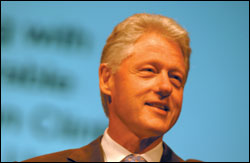BILL CLINTON, “the most popular president since John F. Kennedy,” according to his introduction, appeared before a packed house at McCaw Hall last week looking trim, fit, and ready for another term, or two or three. He received a rousing Seattle welcome from a crowd that paid good money to come to the charity fund-raiser sponsored by Foolproof. So enthusiastic were they that Clinton advised, “You’ll have to calm downyou’ll have me thinking I’m president again!”
Most of the audience likely already had that in mind, if only the damned Constitution wasn’t standing in the way. (Why hasn’t John Ashcroft tossed out that part?) And for many of those Democrats and independents suffering from “Clinton fatigue” in 2000, events since have awakened them to how good it was during the Bill and Hillary years.
But the Bill Clinton of now is not necessarily the Bill Clinton of then. Out of office and making big money on the speaking circuit, traveling the world as a young and vital “elder statesman,” the ex-president seems both more relaxed and more mature.
During the 1992 presidential primary campaign, Clinton was taunted by an opponent, the late Paul Tsongas, for being a “pander bear,” and to some extent Tsongas was rightcertainly enough right that the image stuck. One of Clinton’s characteristics is a desire to please everyone, an essential quality in a successful politician (as Tsongas soon found out), but often a fatal flaw in a leader.
Speaking of Tsongas, he was popular with many local Democrats back in ’92. In fact, Seattle was slow to warm to Clinton’s boyish Southern charm. Instead, many favored the flinty, truth-telling New Englander Tsongas, who appealed to our uptight Scandinavian form of progressivism. Let that be a warning to Democrats in 2004: the American people as a whole can stand only so much flinty New England truth telling. It wears thin if it comes without an appealing, uplifting vision.
CLINTON SEEMED to want his Seattle audience to think well of himhe emphasized that he was writing “every word” of his autobiography himself, and his speech was filled with reminders of his policy successes. (“We broke up 20 Al Qaeda cells!”) At the same time, Clinton is not afraid to tell his audience things they might not want to hear, but not in that heavily plotted Sister Souljah-moment kind of way.
His talk emphasized America’s position in the world, covering trade, terrorism, global community, and Iraq. Clinton refused to criticize President Bush for acting on weapons of mass destruction. Nor did he apologize for his belief in free trade and globalization. Not that his Seattle listeners were the anti-WTO crowdit was as nicely dressed a Seattle crowd of upscale, middlebrow, well-heeled liberals as you’ll see. Nevertheless, there are many Democrats who are not so sanguine about free trade, and there are many who have not embraced the notion that free-market capitalism is the savior of the world. And while Clinton was highly critical of many of Bush’s policieson the economy, on isolating the United States from the international community, on dealings with North Koreahe did not engage in the kind of gratuitous and oh-so-pleasurable Bush bashing some of us enjoynay, require to make it through another day.
HE ALSO TOLD Democrats to stop carping about the Democratic field in 2004, saying he knows that many of them would make excellent presidents. He did this all without any of those trademark “I’m-cute-aren’t-I” smirks of yesteryear.
Clinton seemed more grown-up, more thoughtful, in command of his facts, a statesman less interested in feeling our pain than doing something about it. He paints a vision of a world of shared values, responsibilities, and benefits. It’s an integrated world in which nations cooperate, make deals, and play well together because they have to.
“Diversity is important,” Clinton said, “but our common humanity matters more.” But it is also a highly pragmatic world. “If you live in an environment where you can’t kill, occupy, or jail your adversaries, you have to make a deal.” Making deals, of course, is one of the things we hire presidents to do. It is usually infinitely preferable to making wars, especially in this age when acts of war are borderless.
Clinton described being president as serving as “punching bag in chief.” No wonder he looks so good now. With time, money, appreciation, a powerful wife, and a bully pulpit, he has everything necessary to continue his growth. I was struck that he had the makings of a truly great president. It’s too bad we can’t send him back now that he’s ready.







